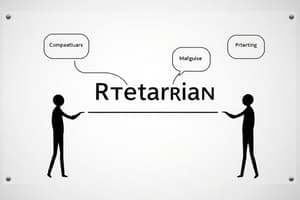Podcast
Questions and Answers
Which elements are considered in a rhetorical analysis?
Which elements are considered in a rhetorical analysis?
- Author, medium, context, and content
- Audience, purpose, medium, and context (correct)
- Audience, author, purpose, and content
- Author, purpose, medium, and content
What does a strong rhetorical analysis do?
What does a strong rhetorical analysis do?
- Evaluate the text (correct)
- Compare the text
- Describe and analyze the text
- Summarize the text
What does the term 'audience' refer to in a rhetorical analysis?
What does the term 'audience' refer to in a rhetorical analysis?
- The author of the text
- The medium of the text
- Spectator, listeners, and/or readers of a performance (correct)
- The purpose of the text
What is the relationship among the elements of any communication called?
What is the relationship among the elements of any communication called?
What does a rhetorical analysis make an argument about?
What does a rhetorical analysis make an argument about?
What does a rhetorical analysis consider in order to make an argument about a communication?
What does a rhetorical analysis consider in order to make an argument about a communication?
What does a strong rhetorical analysis do in addition to describing and analyzing the text?
What does a strong rhetorical analysis do in addition to describing and analyzing the text?
What does the term 'rhetorical situation' refer to in a communication?
What does the term 'rhetorical situation' refer to in a communication?
What do the terms 'spectator', 'listeners', and 'readers' refer to in a rhetorical analysis?
What do the terms 'spectator', 'listeners', and 'readers' refer to in a rhetorical analysis?
What does an author's perception of an audience determine in a rhetorical analysis?
What does an author's perception of an audience determine in a rhetorical analysis?
Flashcards are hidden until you start studying
Study Notes
Rhetorical Analysis
- A rhetorical analysis considers various elements, including the author, audience, purpose, tone, and context.
- A strong rhetorical analysis does more than just describe and analyze the text; it makes an argument about the communication.
Audience
- In a rhetorical analysis, the term 'audience' refers to the people the author is trying to persuade or communicate with.
- The terms 'spectator', 'listeners', and 'readers' are all used to describe the audience in different contexts.
Elements of Communication
- The relationship among the elements of any communication is called the 'rhetorical triangle', consisting of the author, audience, and context.
- The 'rhetorical situation' refers to the circumstances surrounding the communication, including the author, audience, and context.
Author's Perception
- An author's perception of an audience determines how they tailor their message to appeal to that audience.
Analysis
- A rhetorical analysis makes an argument about a communication by considering the author's purpose, tone, and context.
- A strong rhetorical analysis goes beyond description and analysis to make a claim about the communication's effectiveness or meaning.
Studying That Suits You
Use AI to generate personalized quizzes and flashcards to suit your learning preferences.




